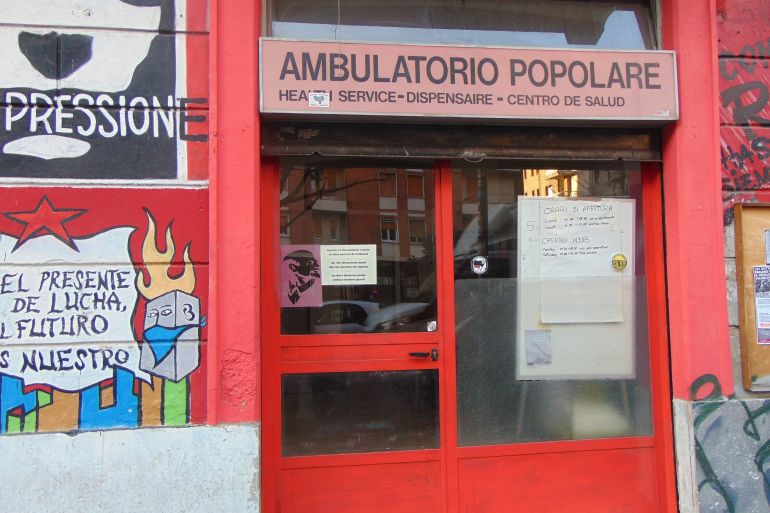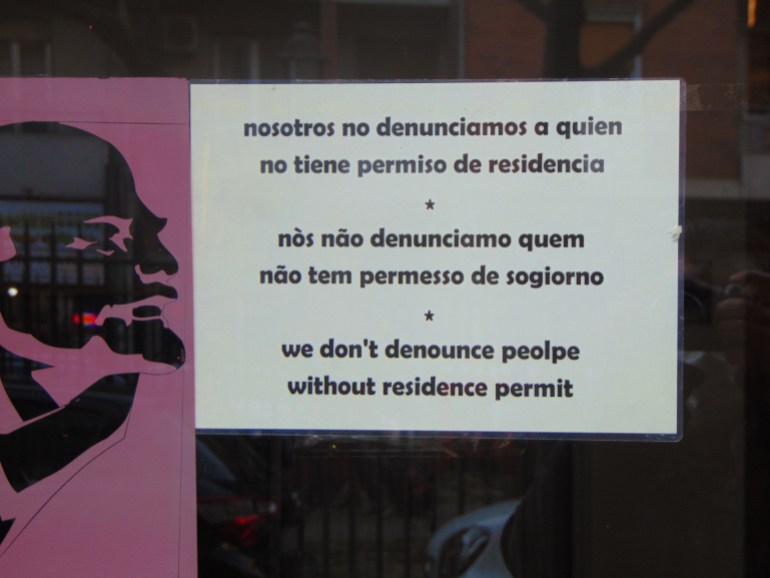In Milan, a free medical clinic serves migrants in the pandemic
The People’s Medical Clinic, which has met the community’s needs for 25 years, is under pressure as the pandemic grips.

Milan, Italy – On a winter afternoon in Milan, a group of people head towards via dei Transiti, a narrow street that runs alongside a small public park, to enter a red building.
A sign on its glass door says, in multiple languages: “We do not denounce people without a residence permit.”
Keep reading
list of 4 itemsWHO team meets Chinese scientists as COVID investigation begins
WHO says vaccine hoarding ‘keeps pandemic burning’
Women are on COVID global front line, but left behind in recovery
Ambulatorio Medico Popolare (AMP) – the People’s Medical Clinic, is an independent, free clinic located in a squatted building in Milan’s Loreto neighbourhood.
The clinic helps people in need who are unable to access Italy’s public health system, especially undocumented migrants and refugees.
And since the COVID-19 pandemic started, its work has become more important than ever.
Thousands treated
The clinic opens two days a week: on Monday for chronic patients, such as those with diabetics who need constant checks, and on Saturdays for anyone else.
Since it was founded in 1994, it has treated more than 5,000 people.
“In the early days the patients were mostly North Africans, highly educated and with good chances of improving their economic conditions,” says Sandra, a volunteer at the clinic.
“Now it’s mostly immigrants from South America and Bangladesh, many of them exploited, illegally hired and vulnerable to blackmail.”

Like all of the clinic’s staff Al Jazeera interviewed, Sandra asked to be identified only by her first name, because public healthcare workers are not permitted to talk to media.
“Many of our patients are street vendors with orthopaedic problems,” said Daniele, a nurse who has volunteered at the clinic for 10 years.
“Others have breathing issues, [exacerbated] by poor housing conditions, like seven or eight people cramped in a studio apartment,” she said.
Luis, a 50-year-old from Salvador, is waiting for his turn.
“I’ve been in Italy for three years, I’ve worked as a cleaner, doorman and a parking security guard. But last year, I lost my job,” he told Al Jazeera.
“This is the third time I am coming here. In the past few days, I had a severe headache and sore throat.”
‘Trying to fill a gap’
The main challenge for refugees seeking healthcare is that many do not have a social security number, which they need to access a primary physician.
“Here we are trying to fill a gap, to give a doctor to those without a residence permit,” said Giacomo, a 30-year-old doctor at AMP.
In Italy, healthcare is free.
“We have advanced laws on health care, and in theory, undocumented migrants have the right both to urgent and continuous care,” said Salvatore Geraci, a doctor who has co-written a report on refugees’ welfare during the pandemic. “But there’s a difference between theory and practice.”
In Italy, all free-of-charge care must get the green light from a family doctor.
Refugees and migrants receive a temporary social security code that grants them access to hospitals, but not to standard medical care.
And with the pandemic, their situation has become even more precarious.

In normal times, those in need of occasional medical care would simply go to the emergency room.
But with COVID-19, this is no longer possible.
With the virus ravaging northern Italy especially, the hospital system in the Milan area is strained, and emergency rooms are full of COVID patients.
Other clinics that support refugees have shut down during the worst moments of the pandemic, as AMP remained open.
“During the lockdown, we expected a boom in people but it didn’t happen,” said Sandra, the volunteer.
As police patrolled the streets to enforce the lockdown, refugees were reluctant to leave their homes even when they needed medical attention, she said.
They feared deportation.
“One of our patients, who has been living in Italy for 10 years, was stopped by the police on his way to the clinic, and was ordered to be deported,” said Danilo, the volunteer. “We made an appeal and the order was cancelled, but it’s not difficult to imagine the psychological reaction of this person.”
COVID hammers Italy’s healthcare system
In the spring, however, refugees visited the AMP to receive treatment in greater numbers.
“We had to readjust some spaces because there were too many patients,” said Daniele.
“Patients with chronic or degenerative diseases were a month behind with their treatments, they have missed so many screenings and therapies. Were it not for this place, they would have run out of medicine.”
Today, the People’s Medical Clinic helps patients and people who need a COVID swab test, but do not know how to proceed.
“It’s a frequent problem recently,” said Giacomo, the doctor. “Some people need it for clinical reasons, others for work reasons, because the boss asks to do so.”
In Milan, getting a swab test is not easy.
In public hospitals, there are long waiting lists, so people are forced to turn to expensive private clinics, which most refugees cannot afford.
Some public hospitals test for COVID-19 using drive-throughs, and many migrants and refugees do not own cars.

As he speaks, Giacomo is regularly interrupted by volunteers who need help with patients and him to sign prescriptions.
Looking at that scene, Sandra said: “When we first opened, we thought our work would be temporary.
“Immigration is a new phenomenon, we thought, and authorities will figure out how to provide them with medical care. Almost 25 years later, we’re still here.”